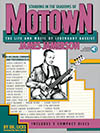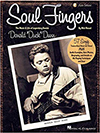You used to know the song by the bassline. Are we getting gipped?
By Jon Liebman
Week of March 30, 2020
Any list of iconic bass players is certain to include names like James Jamerson and Duck Dunn near the top, particularly when the focus is on soul and R&B. Music was definitely different in the ‘60s and ‘70s. What’s more, basslines were different from what they are today.
I had a very inspiring interview with dUg Pinnick, published this week on FBPO, in which he weighed in on that very subject. In the course of our conversation dUg made some pretty powerful statements about the state of bass that are sure to make a lot of people perk up.
Basically, his message was that bass playing just isn’t what it used to be, and that the instrument has lost its identity. Can that really be true?
Specifically, dUg cites Dunn and Jamerson, and others from the Stax/Volt and Motown periods, as the ones who got it right. “Those are the bass players that taught us how to play bass,” says dUg, “not follow a guitar,” underscoring the stark difference in the way the bass role used to be filled. “Back in the day, bass players dominated,” he says. “You knew the song by the bassline.”
Nowadays, it’s all different, says dUg. Instead of being the instrument that makes the people dance, the bass has been relegated to the background, copying guitar and piano riffs, losing its independence in the process. “It’s annoying when you put a record on and all you hear is guitar,” dUg says. “The bass is so far in the background, you can’t hear it.” Especially because they’re not playing anything unique, he contends.
Instead of being inspired by what they could be hearing, he says, people are missing out on an important part of music today. The lack of identifiable bass has sapped out the excitement that used to exist for the instrument “because there’s nothing there to listen to. You’re gipping the people.”
I suppose there could be some truth to what dUg’s saying, depending on how you spin it. It really depends on what you’re listening to. The fact that styles change, is not necessarily a bad thing. At For Bass Players Only, we’re all about the groove. All of our lessons and courses are groove-oriented, even the Scales & Theory and Sight Reading courses!
I have enormous respect for James Jamerson and Duck Dunn. I say if the song calls for a soulful or Motown-inspired danceable bass line, go for it. And if the song is better served with low, growling whole notes, then play the most beautiful low, growling whole notes you’ve got. As long as you’re sensitive to what’s going on around you and you give the music whatever it needs, you’ve got the makings of a good bass player.
How about you? Have a thought on the subject? Leave a comment below and let me know what you think. In the meantime, you can watch my interview with dUg here.
These must-have James Jamerson and Duck Dunn transcription books are available in the FBPO store:
 Standing in the Shadows of Motown: The Life and Music of Legendary Bassist James Jamerson
Standing in the Shadows of Motown: The Life and Music of Legendary Bassist James Jamerson
 Soul Fingers: The Music & Life of Legendary Bassist Donald “Duck” Dunn
Soul Fingers: The Music & Life of Legendary Bassist Donald “Duck” Dunn






Like you say, it really depends on what you listen to. I love bass-driven ‘songs’ and there are many bands that still bring that, but I have to admit, you don’t hear that on mainstream radio and they don’t appear in the charts. On/in there it’s all the same stuff, with sometimes some nice surprises like for instance ‘Uptown Funk’ or more recently ‘Don’t start now’ by Dua Lipa (and some more nice tracks on her new album). I listen a lot to Jamiroquai (a band that band has always been very bass-driven) and their bass player, Paul Turner, also plays in a band called Brother Strutt. Great stuff but you don’t hear that on the radio. Or the Dutch band Tristan, with Frans Vollink on bass, I love his playing but they get hardly played on the well-known broadcasters. It’s a shame, there’s so much good music a lot of people well never hear and artists that won’t get the recognition they deserve …
Love dUg, a truly great guy, but he’s just as guilty of following the guitar as anyone. True, he may be writing a lot of those riffs, but he and Ty Tabor often reinforce each other.
Bass has not lost its value to music as far as I’m concerned. All along, there have been bass players who play simply, players who stand out a little more, and some stand out a lot more. It has always been thus and it will always be that way. Good music will remain good music regardless.
Has the Bass lost it’s Mojo?
Maybe it’s not the instrument, but maybe the newer crop of tunes and players.
You mentioned the greats…Jamerson, and Duck Dunn.
The tunes out of Motown, and Stax, from back in “The Day”, were ,on the most part, heavily bass groove driven.
Great examples of Motown tunes, with great Jamerson bass lines, were, (in my opinion) “Darling Dear”, (Jackson 5)
“Ain’t No Mountain High Enough” ( Marvin Gaye, Tammi Terrell) “What’s Going On” (My favorite, Marvin Gaye) and of course, The Four Tops, “Bernadette”.
Jamerson layed down a bass line that drove and defined the songs.
Some of Duck’s defining bass lines, in my opinion, are “Respect”, Otis Redding , “Soul Man”, “Can’t Turn You Loose” “Knock On Wood”, and any number of Booker T and The MG’s Tunes.
Another bass player that had some ferocious bass lines was Tommy Cogbill. Tommy’s work on “Dusty In Memphis” was exemplified in his basslines on “Son Of A Preacher Man” Busy? Yes…but it fit.
Tommy’s work on Aretha Franklin’s RESPECT was a great groove. Duck Dunn did the bass lines on Otis Redding’s RESPECT. Compare the 2 sometimes.
Wilson Pickett’s “Funky Broadway” was a driving Cogbill line, as well as Elvis’ “Suspicious Minds”
A bass player who probably doesn’t get the spotlight as much as he should, is Chicago’s Bernard Reed. His work on Tyrone Davis’ “Turn Back The Hands Of Time”, and “ Can I Change My Mind” drive these tunes.
I enjoy John Entwistle’s Bass playing and lines…a very powerful Rock player. I was very fortunate to associate with Duck, Cogbill, and Entwistle along my bass playing career. Got some sage advise from Duck as a young Bassman, and developed a great friendship with Cogbill around 1969. I did a show as an opening act for The Who around 1969, and Entwistle gave me a few sets of Rotosound strings, which defined his sound. We were all playing LaBella 760 flat wounds at the time. We had never heard of Rotosounds at that time, and I put them on my 59” P Bass. A very enlightening experience!
No, I don’t think “The Bass” has lost it’s Mojo. There are still many who keep the groove happening…both the current crop, and us “Veteran Players!”
The way i see it now as i’v gotten older ,Is that the Bass to me is just part of the bigger picture in the Composition .Its just part of all the elements that make the Composition sound good.I don’t think that the Bass has lost its identity at all when one is playing real Music.